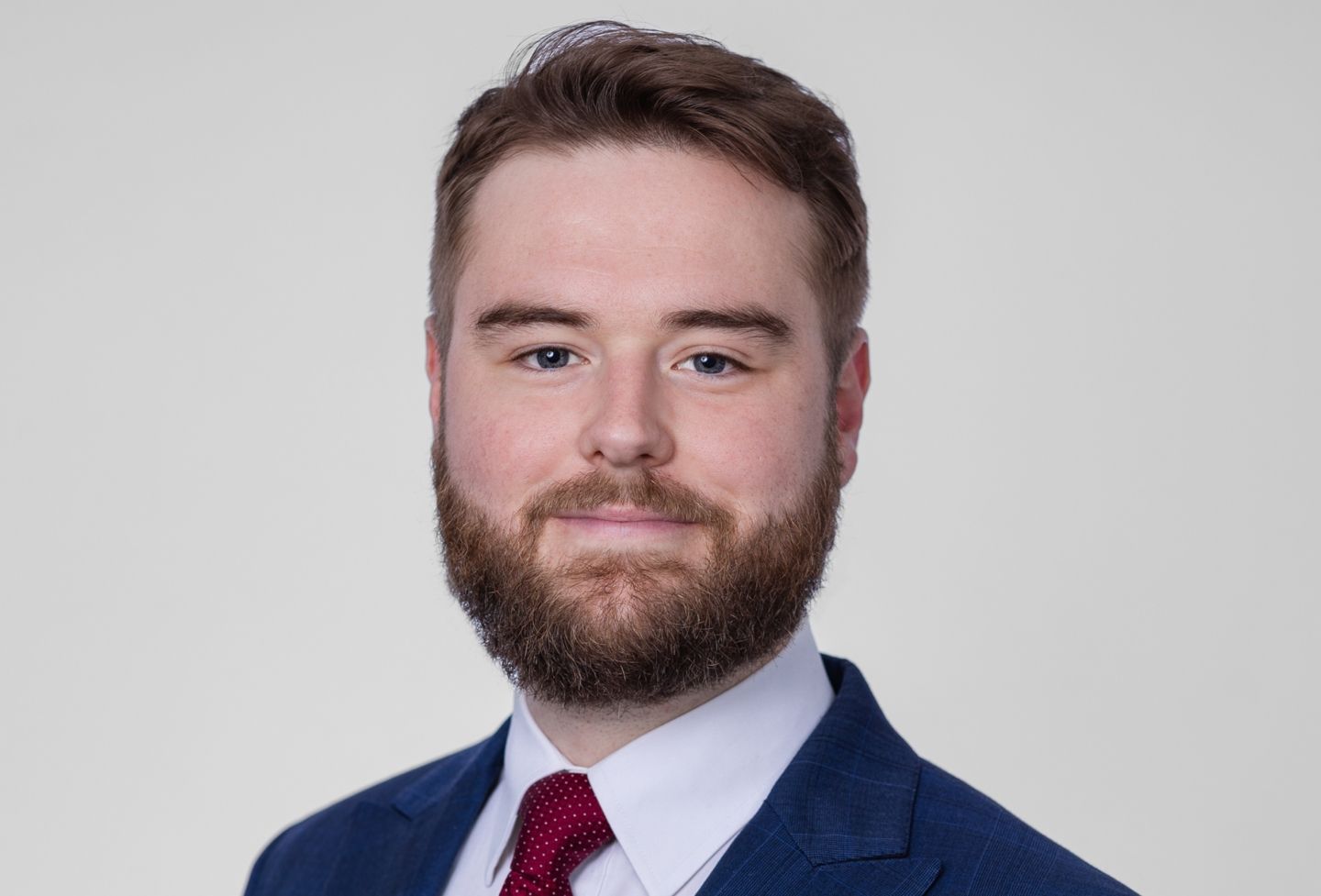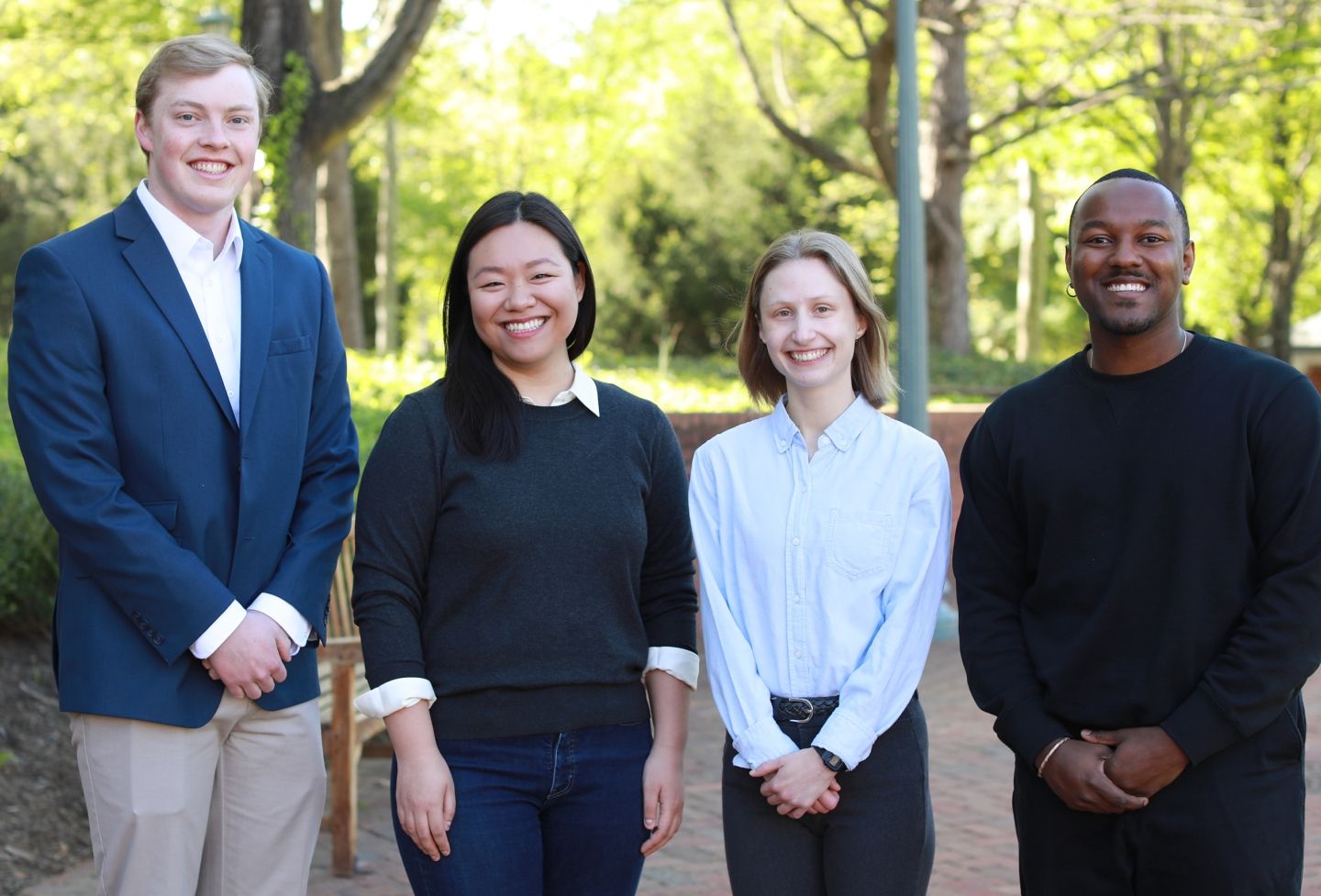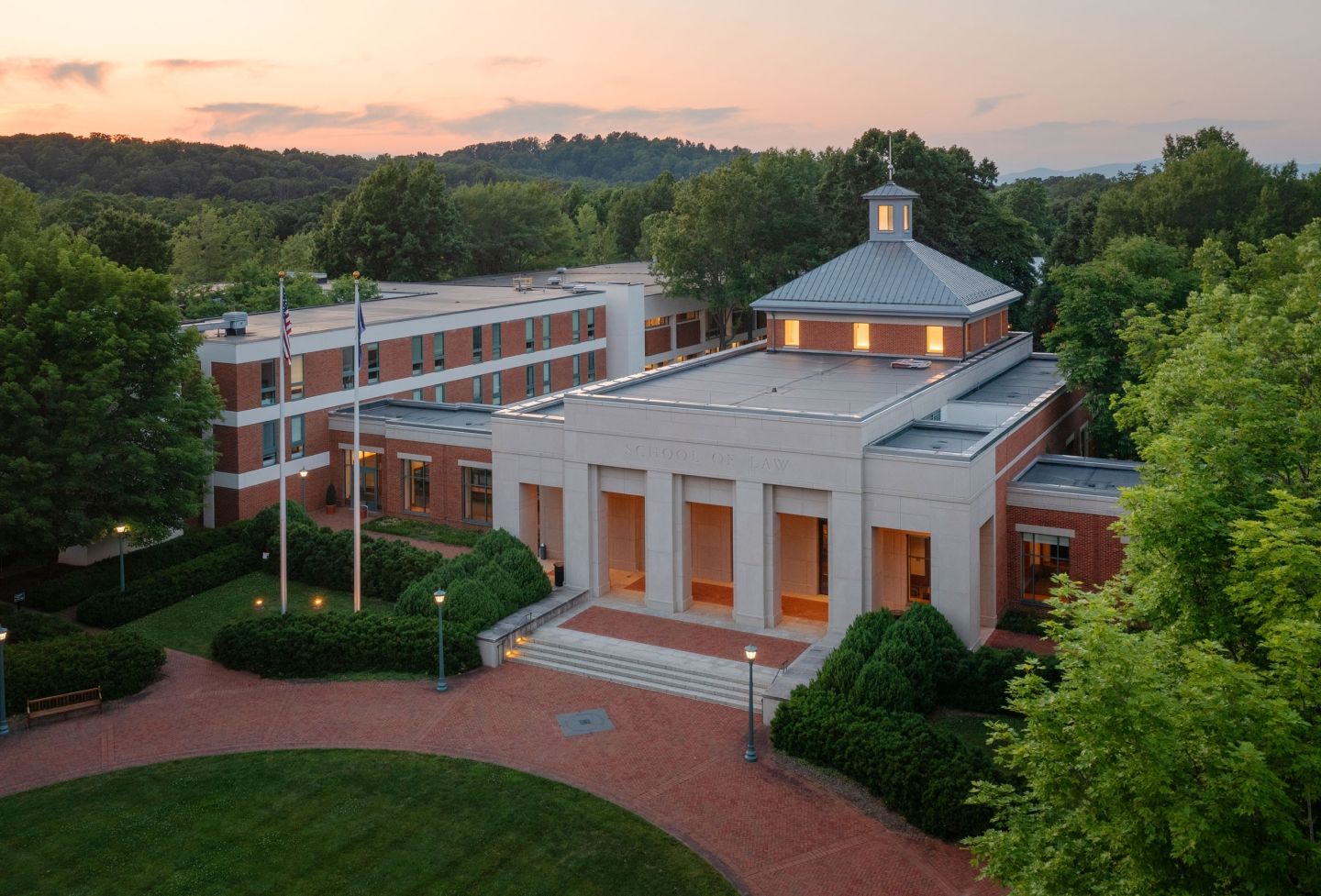He hasn’t started his legal career yet, but James Hornsby ’24 is pretty sure he’s already endured his worst day at work.
He was 20, on a break from college and tasked with stirring a manure lagoon on his family’s farm in rural Tennessee, when he suddenly tumbled in. He emerged dripping liquid cow manure from head to toe — excrement spilling over the tops of his muck boots, his eyes caked and ears coated in brown.
“I crawled out and my dad was like, ‘Just hose off, boy, and get back to it,’” Hornsby said. “Bad day at the office, but that’s how you have to handle things sometimes. I always say, ‘What doesn’t kill you makes you funnier.’”
Perhaps he had several brushes with death, then, because when he graduates with his classmates on Sunday, one thing he can say with certainty looking back is that he made people at the University of Virginia School of Law laugh.
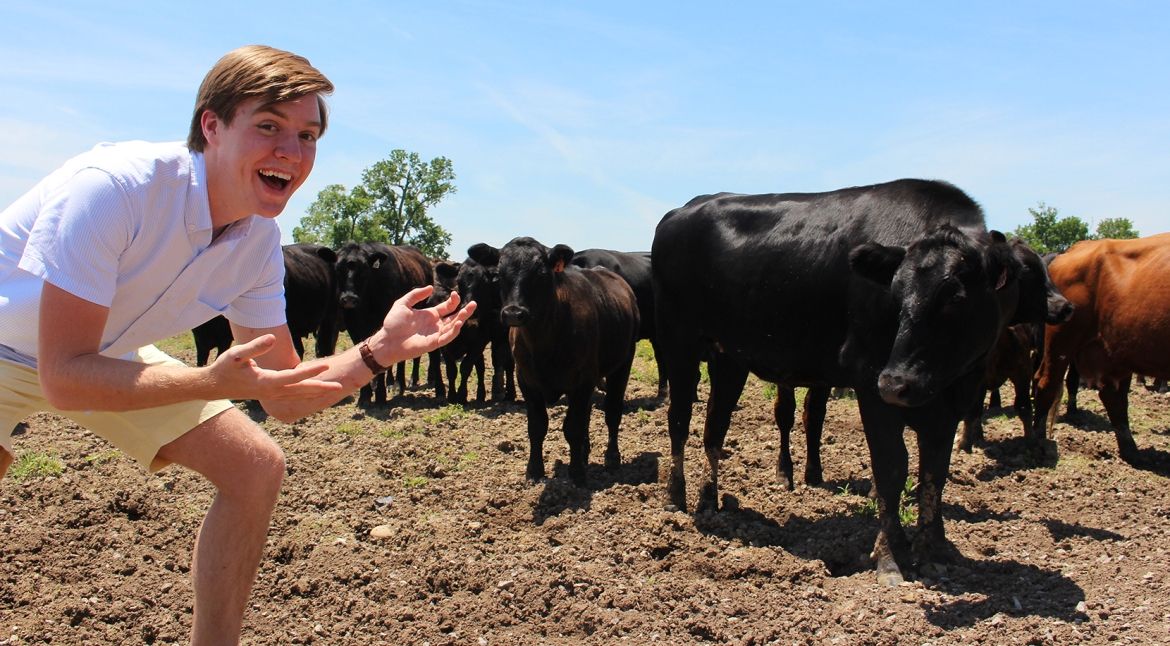
A self-described “theater-kid has-been,” Hornsby performed in UVA Law’s annual Libel Show all three years and took the helm of the comedy sketch revue his third year. Woven throughout this year’s show, his impersonation of a certain presidential candidate drew side-splitting laughs from the audience. Last year, he dressed in colonial drag to portray one of Libel’s “Founding Mothers,” Jamie Mad-at-her-son. His first year of Libel, he donned a wig to portray Dean Risa Goluboff in a takeoff of 'Hamilton's' King George, singing “You'll Be Back.”
“What I loved was leaning into the ridiculousness of it all,” Hornsby said. "We’re grown adults putting on a play for all our friends — and we’re rehearsing it quite seriously.”
He’s been known to ask for help by belting out a Patti LaBelle quote — “Where’re my background singers?” — from the time she was left in a lurch at a 1996 White House performance, according to Madalyn Moore ’24, his co-chair for this year’s gala celebrating Lambda Law Alliance’s 40th anniversary.
“We sing it back and forth all the time, but whenever we do that, we come together and see how we can tackle problems together,” Moore said.
Kate Granruth ’24, noted that Hornsby once loaned her his “beautifully constructed” Civil Rights Litigation outline.
“It was exactly like any top-notch outline,” Granruth said, “except that every Supreme Court holding was synthesized as ‘Supreme Court said NO, GIRL!’ or ‘YES, GIRL!’”
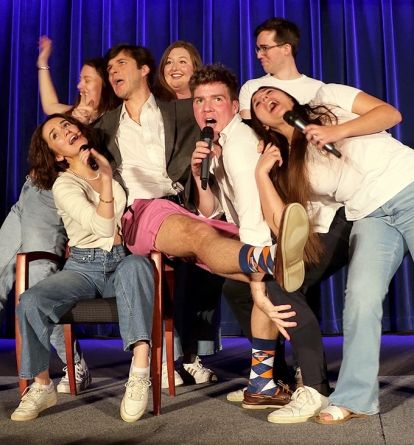
While Hornsby tends to speak in punchlines and erupt into infectious laughter, he does have a serious side, which showed itself while discussing the farm along the Tennessee River in Decatur, Tennessee. It’s been in his family for five generations and its size has been reduced three times — twice through eminent domain — to make way for railroads, a dam and a nuclear power plant.
It’s not clear who, if anyone, will keep it in the family.
He also spoke seriously of his role as the Law School’s delegate to the UVA Honor Constitutional Convention and as one of the primary drafters of the new multi-sanction Honor Committee constitution, which eliminated the one-year suspension as the sole punishment and restored expulsion as an option.
“The new system is much more focused on restorative justice and this idea that if you screw up, you’re at a university and we should be willing to help you learn from your mistakes,” Hornsby said. “With a yearlong suspension, you lose your scholarships, you have to go away for a year — if you’re a lower-income student, where are you going to go?”
He was so serious about the Virginia honor code, in fact, that he sought out a special arrangement to represent the Law School through his affiliation with the Libel Show when the Honor Committee turned him away as a Student Bar Association representative.
Before attending the Law School, Hornsby was student body president at Samford University, a small Christian college in Birmingham, Alabama. During his term, he created that school’s first honor code, blending and revamping aspects of Samford’s previous “values system” with its “academic integrity system” to create a more equitable and lenient code.
“One of my proudest moments was being able to add a provision saying it’s an honor code violation to discriminate based on sexual orientation and gender identity,” Hornsby said. “I was in the closet at the time — a glass closet — because I knew Samford was not a safe place for me to be out, but I also knew that I was tough, and I could make it better for students who came after me.”
When he was admitted to UVA Law, Hornsby was immediately welcomed by ambassadors who openly identified as LGBTQ+, a kindness he has gone on to repay by serving as both a Law School Ambassador and as president of Lambda Law Alliance.
“It was incredibly eye-opening and transformative, this idea that I didn’t have to apologize for being me,” Hornsby said. “I didn’t have to pretend, I didn’t have to go by an unspoken ‘don’t ask, don’t tell’ policy.”
Hornsby has also served as a Peer Advisor, an SBA senator, a senior member of the editorial board of the Virginia Journal of Social Policy & the Law, and a research assistant for Professor Anne Coughlin. He was named a Ritter Scholar at the beginning of his third year.
Coughlin called him “brilliant and analytical, ferociously hard-working, ethical” and “a natural leader who doesn’t need a title to be effective.”
She wasn’t finished. Coughlin also called him “deeply kind, witty and well-read, extremely graceful under extreme pressure, willing to confess his errors and forgiving of those who themselves have erred.”
No matter how much work Hornsby took on, he always delivered, said Grace Allaman, who served on the Lambda executive board and Libel Show with him.
“He’s involved with pretty much everything and is always thinking about how to make people’s lives better and improve our community here,” Allaman said. “No matter what chaos ensues, he charges ahead with a smile on his face and never gives up.”
Reflecting on the depth of his involvement, Hornsby saluted the five generations of farmers in his family, who valued education, learned that you can quickly lose that which seems permanent, and taught him to be grateful for opportunities handed down from past generations.
“I think part of what drove me to be so involved was because I’ve worked in the Admissions Office, so I realized just how many people would kill for the spot [at the Law School] I had,” Hornsby said. “And post-COVID, our class was tasked with bringing back all these big traditions that UVA Law was known for, and making sure that the things that make this place so special continue on.”
Among many other accomplishments she cited, Coughlin lauded Hornsby’s efforts to put together the Lambda gala, calling it “a party the likes of which the Law School has never seen.”
“While he was here, James made everything better,” Coughlin said. “He brought us joy. And his work here will endure, as he helped to shape the lives we might live.”
After graduation, Hornsby will work in the government investigations and white-collar litigation group at McGuireWoods in Washington, D.C.
Founded in 1819, the University of Virginia School of Law is the second-oldest continuously operating law school in the nation. Consistently ranked among the top law schools, Virginia is a world-renowned training ground for distinguished lawyers and public servants, instilling in them a commitment to leadership, integrity and community service.
